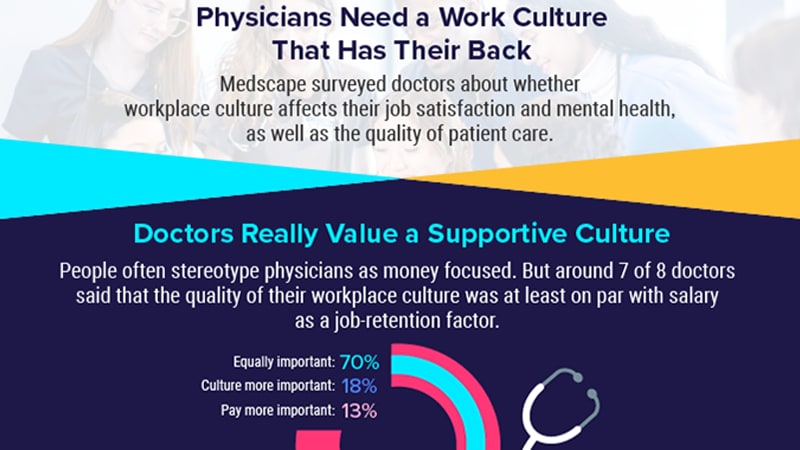Physicians Value Workplace Culture as Much as Compensation, Medscape Survey Reveals
핵심 개념
Physicians place significant value on workplace culture, with the majority considering it as important as their compensation.
초록
The content highlights the findings of a Medscape survey on physician workplace culture. Key insights include:
- Around 7 out of 8 doctors surveyed said that the quality of their workplace culture was at least as important to them as their paychecks.
- Approximately 8 out of 10 physicians believe that a supportive culture is achievable for their employers, despite the rigors of modern medicine.
- Doctors emphasized the importance they place on a supportive office environment, challenging the stereotype of them being solely focused on money.
- The Medscape Physician Workplace Culture Report 2024 provides more detailed insights on this topic.
요약 맞춤 설정
AI로 다시 쓰기
인용 생성
소스 번역
다른 언어로
마인드맵 생성
소스 콘텐츠 기반
소스 방문
www.medscape.com
Infographic: Office Culture More Than Catchphrase for Docs
통계
Around 7 out of 8 doctors said the quality of their workplace culture was at least as important as their paychecks.
Roughly 8 out of 10 physicians said a supportive culture is absolutely achievable by their employers.
인용구
"Physicians often get stereotyped as money focused."
"Around 7 of 8 doctors responding to a Medscape survey said that the quality of their workplace culture was at least as important to them as their paychecks."
"Roughly 8 of 10 physicians said that a supportive culture is absolutely achievable by their employers, even given the rigors of modern medicine."
핵심 통찰 요약
by Jon 게시일 www.medscape.com 08-29-2024
https://www.medscape.com/viewarticle/infographic-office-culture-more-than-catchphrase-docs-2024a1000fal
더 깊은 질문
What specific factors contribute to a supportive workplace culture for physicians, and how can employers effectively foster such an environment?
A supportive workplace culture for physicians is built on several key factors. Firstly, clear communication and transparency within the organization are crucial. Physicians value being kept informed about decisions that affect their work and having open channels for feedback. Secondly, a strong sense of teamwork and collaboration is essential. Physicians thrive in environments where they can work closely with colleagues, share knowledge, and support each other in providing the best patient care.
Employers can foster such an environment by promoting a culture of respect and appreciation. Recognizing the hard work and dedication of physicians, providing opportunities for professional growth and development, and offering a healthy work-life balance all contribute to a supportive workplace culture. Additionally, creating forums for open dialogue, implementing wellness programs, and addressing any issues promptly can help maintain a positive environment for physicians.
How do the perspectives of physicians on workplace culture compare to those of other healthcare professionals, such as nurses or administrative staff?
While physicians prioritize workplace culture, their perspectives may differ from those of other healthcare professionals like nurses or administrative staff. Physicians often emphasize the importance of a supportive culture due to the demanding nature of their work, the high stakes involved in patient care, and the need for collaboration with colleagues. They value environments that promote their well-being, professional growth, and effective teamwork.
On the other hand, nurses and administrative staff may also value supportive workplace cultures but may place more emphasis on factors like work-life balance, job security, and opportunities for career advancement within their respective roles. While all healthcare professionals seek a positive work environment, the specific aspects that contribute to a supportive culture may vary based on their roles and responsibilities within the healthcare setting.
What are the potential long-term implications of physicians prioritizing workplace culture over compensation, and how might this impact the healthcare industry as a whole?
Physicians prioritizing workplace culture over compensation can have significant long-term implications for the healthcare industry. While compensation is important, a supportive workplace culture can lead to higher job satisfaction, lower burnout rates, and improved patient outcomes. By focusing on creating a positive work environment, physicians are more likely to stay engaged, motivated, and committed to their profession.
In the long run, prioritizing workplace culture can result in better retention rates, increased productivity, and enhanced quality of care. This, in turn, can positively impact the overall healthcare system by reducing turnover costs, improving patient satisfaction, and attracting top talent to the field. Ultimately, a strong emphasis on workplace culture among physicians can lead to a more resilient and effective healthcare industry.
0
